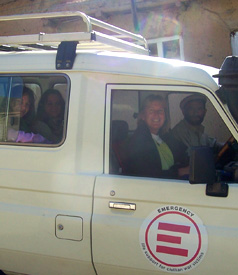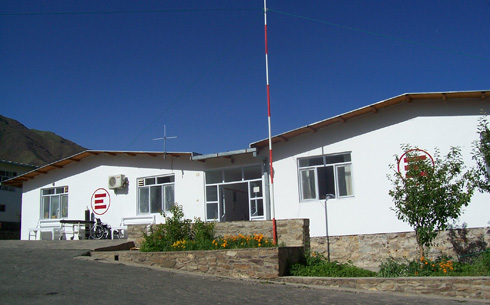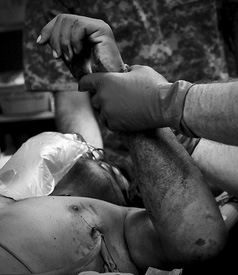For six days in late May 2010, Emergency, an Italian NGO providing surgery and basic health care in Afghanistan since 1999, welcomed us to visit facilities they operate in the capital city of Kabul and in Panjshir, a neighboring province. We lived with their hospital staff at both places and accompanied them in their weekly trips to various FAPs (First Aid Posts) which the hospitals maintain in small outlying villages.
One morning, accompanying a field officer from the Kabul hospital, we pulled off of the main road and traveled over unpaved lanes, then walked a short distance to a shady grove outside a small Afghan village. Villagers, eager to welcome Emergency’s staff and drivers, served ripe mulberries and a salty, cucumber yogurt drink. We sat in a circle, shaded by the trees. When breezes stirred the branches, we’d enjoy a momentary rain of mulberries, much to the amusement of little children nearby.
The five youngsters, age five to ten, smiled shyly at us, shook our hands and then joined their older brother to systematically gather mulberries. Using a large hoe, the older brother slammed the tree trunk. The children caught the cascading mulberries in a plastic tarp. Then they sorted the fruits, seeming to take discipline and routine for granted.

Emergency workers in Afghanistan.
Earlier, Felippo, an Emergency nurse in Panjshir, had told us about how hard life can be for Afghan children in rural areas. “They never get a day off,” exclaimed Felippo. “Never. If they attend school and school is closed for a day, the kids join workers in the fields.” Felippo, who has been to Afghanistan for three six-month rotations, fantasizes about building a theme park where kids could play and be entertained.
The majority of Afghanistan’s agricultural laborers, both children and adults, face harsh realities.
Many villagers have little access to health care or education. Diseases such as pneumonia, gastroenteritis, malaria and malnourishment contribute toward the deaths of 850 Afghan children every day.
In rural areas, a family typically has 10 to 15 children. Not all are expected to survive. When a child is born, a ceremony to name the infant takes place several months later because the child’s survival of the first months of life is a cause for great relief and celebration.
Felippo’s supervisor, Micha, the medical director at the Panjshir Hospital, explained that malnutrition is a social problem. “Mothers aren’t instructed about nutrition,” she said. “Sometimes in large families, the four year old is in charge of the one year old. Or the mother doesn’t breast feed during the first month – the most crucial month. If fraternal twins are born, the boy will be breast fed, but not the girl.”
“They don’t come to the hospital when symptoms of sickness appear,” Micha continued. “They wait till a child is near death. Malnutrition is difficult to manage. Children will become healthy, but the malnourishment recurs; it’s often fatal.”

Emergency center in Afghanistan.
“Poor hygiene is another serious problem, especially if families can’t provide clean water,” Micha pointed out, “and, you see, this is also related to poverty. Sometimes the children drink unclean water, causing gastroenteritis.”
Intent on helping solve these basic problems, Emergency workers use the FAPs to educate people about nutrition and basic hygiene. In winter months, the roads often become impassable. In some places, Felippo hikes for two hours beyond the point where a vehicle can’t continue, carrying medicine and supplies in his backpack.
“Can you imagine,” asked Felippo, “that last year, when I finished my term of service, in January, when it was my last visit to a First Aid Post that is furthest from our hospital, people walked four hours in the snow to say goodbye to me? Yes, I fell in love.”
It isn’t hard to imagine why the staff feels so loyal to Emergency’s patients and to the organization’s goals.
Emergency is treating war victims as patients and won’t allow police or military to enter the hospital carrying weapons. Circumstances that occasion an injury or a wound never determine whether or not the patient will be admitted. While neutral as regards offering medical treatment, Emergency has been clearly partisan in it’s rejection of all wars. Their literature and outreach clarifies that the most important preventive measure to safeguard against war-related wounds and injuries is the abolition of weapons.
In a pediatric ward at the Emergency hospital in Kabul, doctors and nurses tend youngsters who’ve mainly been hurt by landmines. Sometimes, the boys go outside and sit on the grass with older fellows. Many share in common the experience of having lost limbs or fingers or toes to landmines or remote-controlled explosions.
One afternoon, we sat in the hospital garden listening to the director of an Afghanistan human rights NGO talk about plans for President Hamid Karzai’s peace jirga, scheduled to begin on June 2, in a tent outside of Kabul. Sixteen hundred people are expected to attend. We watched boys and young men assemble in a circle, all wearing thin hospital gowns, most with bandaged limbs and some having suffered amputations. They were each from different regions and likely held quite divergent views … a jirga of sorts.
Esmatullah, seven years old, came to the hospital a month ago because of a mine injury. He is from the Paktika province. “He has never cried, not once,” said Anil, the hospital’s physical therapist. “Not while dressings were being changed, not during physical therapy. He’s a real Pashtun.” Esmatullah beamed when Anil patted him on the head.
Anidullah, age 11, suffered a bullet injury. He was studying inside the mosque, in his town in the Ghazni province, when a battle erupted between US and Taliban fighters. He doesn’t know which side hit him.
Nur Said, a teenager, lost one eye and has only one finger on his right hand. He is learning to feed himself. An unexploded device exploded when he picked it up. Sometimes, the children try to open up the unexploded devices and take out the brass so that they can sell it.
A young man, age 21, was injured when he was a driver for US forces. He said that the US convoys have GPS systems for the front car and the back car in each convoy. He was driving a Land Cruiser, in the middle of a US military convoy, without benefit of a GPS.
“I could tell a lot of stories,” he says. “Some people were killed for no reason.”
After he was injured, the US forces brought him by helicopter to Emergency’s hospital in Lashkar Gah, where treatment, as in all Emergency facilities, is free of charge. Emergency staff then brought him to Kabul for surgery. The US hasn’t offered this young man any compensation or assistance for future rehabilitation. He’s anxious not to talk more about his case for fear of being harmed.
But asked what he would do if US forces attacked his family, he said he would fight. “I would react against them if they killed my family. If I lose my family, I don’t want the life.”
Unlike ourselves on this visit, the Emergency staff doesn’t ask many questions about what brought patients to their hospital. Their all-consuming task is to help them leave, healed and, as much as possible, physically rehabilitated.
Still, they can’t help but feel frustrations over problems that could be solved if the Westerners who’ve come to Afghanistan would establish priorities more sympathetic to human needs.
“The price of fuel for one of the US warplanes roaring overhead, on a routine flight between Bagram and Kabul, could allow many creative choices if it were made available to an Afghan village,” said Noor Akbari, an analyst working for the Ministry of Agriculture. “Villagers could build a health center, buy a communally owned pump, get assistance to spray the trees, hire a midwife, or organize agronomy training and literacy programs.”
Anil suggested that the concrete used for protective blocks surrounding US bases and checkpoints could build as many as ten dams to provide electricity for people.
Felippo noted that the Italian government spends one million dollars, every day, to maintain Italy’s military presence in Afghanistan. “What could we do with just one day of their funds!?” asked Felippo. “We could build another hospital.”
As the eight-year long war drags on, claiming more victims every day, the US develops increasingly sophisticated means of surveillance, laser-guided bombing and robotized weapon usage. Meanwhile, Taliban bomb makers develop their expertise and teach new recruits to make and plant explosives. “In 2007 there were 2,600 attacks, in Afghanistan, using homemade bombs. In January alone, in 2010, there were 1,000 bomb attacks,” according to a May 30 report in The Sunday Times. “Over the past three years the US military has pumped more than £10 billion into research and technology designed to detect and neutralise the IEDs, (Improvised Explosive Devices) that cost the Taliban just £20 to make.”
If we want Afghans to reject the Taliban’s brand of weapon development and attacks, we in the US need to show our own determination to foster the works of mercy rather than the works of war. The Emergency hospital staff, unarmed and courageous, provide a fine example.
Our most important fundraising appeal of the year
December is the most critical time of year for Truthout, because our nonprofit news is funded almost entirely by individual donations from readers like you. So before you navigate away, we ask that you take just a second to support Truthout with a tax-deductible donation.
This year is a little different. We are up against a far-reaching, wide-scale attack on press freedom coming from the Trump administration. 2025 was a year of frightening censorship, news industry corporate consolidation, and worsening financial conditions for progressive nonprofits across the board.
We can only resist Trump’s agenda by cultivating a strong base of support. The right-wing mediasphere is funded comfortably by billionaire owners and venture capitalist philanthropists. At Truthout, we have you.
We’ve set an ambitious target for our year-end campaign — a goal of $112,000 to keep up our fight against authoritarianism in 2026. Please take a meaningful action in this fight: make a one-time or monthly donation to Truthout before December 31. If you have the means, please dig deep.
